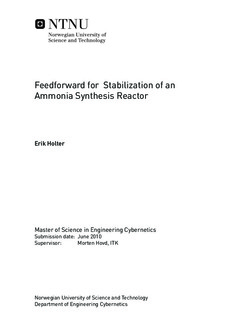Feedforward for Stabilization of an Ammonia Synthesis Reactor
Master thesis
Permanent lenke
http://hdl.handle.net/11250/259812Utgivelsesdato
2010Metadata
Vis full innførselSamlinger
Sammendrag
This thesis illustrates different control structures and tries to demonstrate how feedforward control can be used in stabilizing an unstable ammonia reactor with heat integration. The demonstration of feedforward is done under very special circumstances. While feedback control is necessary for stabilization of the reactor system, feedforward control can be used to avoid input constraints which would otherwise make the input saturate and thereby make the system unstable. It turned out that the ammonia reactor was not the best system to apply the feedforward strategies in question. The main reason is a combination of; the existence of the lower (undesired) steady-state operating point (corresponds to extinction of reaction), positive feedback from the heat exchanger and the manipulated variable range of actuation. The reason is that there are trade offs between making more of the (cold stream) mass flow go through the heat exchanger and making the cold stream mass flow get mixed with the reactor flow between the beds at the quench points. Letting more mass flow entering the heat exchanger will reduce the heat exchanger efficiency. Lowering the efficiency means that the hot stream mass flow through the heat exchanger can not liberate enough heat to the cold stream mass flow entering the heat exchanger. As a result of this, the reactor inlet temperature will decrease because of the positive feedback from the heat exchanger. Thus, it does not exist a range of actuation where the system can be stabilized when influenced by disturbance.
